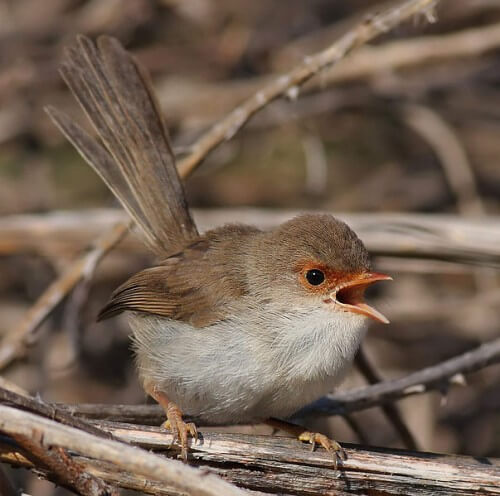The modern plover teaches its chicks a specific tapping song while they are in the swamp, and if it does not know how to answer this song, it means that it is a cuckoo chick, and it is left to starve. A discovery made by chance

The cuckoo is known to everyone and is used as an example of a parasite that does not take care of its chicks, but leaves this concern to the podacas of the genus Perinia (the less known) many species that are known in our regions are the peshush, the gidron and the desert.
In Australia, the "generation flycatcher" (Malurus cyaneus) is common, which, like many of its kind, serves as a host for parasites such as the cuckoo. The cuckoo watches the nest of the sparrow and when the "owner" is not at home it sneaks up and lays an egg in the nest.
Since each cuckoo "learns" to produce eggs that resemble the eggs of the host, the cuckoo does not notice the invasion. The cuckoo chick hatches before its "siblings", grows faster, and throws the host's chicks out of the nest. It turns out that the Australian sparrowhawk has a "patent" to prevent the parasite's chicks from taking over the nest.
Australian researchers from Flinders University in Adelaide publish in: “Current Biology” the results of their research, according to which the baby chicks learn the importance of listening to their mother while in the swamp.
The chicks that have not yet hatched learn a password that is used to identify the chicks that ask for food, thus preventing the waste of energy in raising foreign invaders. Parents who take care of the chicks will only feed them if their call and demand for food contains the password, if the "food demand" does not contain the password the chick will not receive food and will die.
According to the researchers, this is the first time that parental learning has been discovered in birds. This is an accidental discovery when the research team was examining the effect of predation or trampling on the peshush.
When analyzing videos recorded in the nests of the hawksbill, it became clear that the hatcher was singing to the eggs. The hatching female utters the password call continuously and with a frequency of 15 times an hour. It turned out that the hatchlings have a single-sounding food request call. Analysis of the sound showed that it contains the same "song" sung by the incubating eggs.
It also turned out that each nest (that is, each hatchling) has a different password, to check whether the password is innate or acquired, the researchers switched between the eggs in several nests and it turned out that the chicks that hatched read the "adoptive" mother's password, that is, the chicks learned the password before they hatched.
The feeding password plays an important role in identifying parasitic chicks (that are not nestlings) such as the cuckoo that lays eggs in nestlings. The cuckoo chick hatches from its egg before the chickadee. If the parents feed it, it will grow quickly and throw the eggs or other chicks out of the nest, but since it doesn't know the password, it won't get food and will die in a short time.
One could think that the cuckoo chick would also learn the password, but it turns out that the mother starts learning the password about 10 days after laying. Cuckoo chicks hatch after about 12 days of incubation, the peshush chicks hatch five days later, therefore the cuckoo chicks do not have enough time to learn the password.
It is possible that the password has additional advantages that the researchers intend to test, such as: it is known that the female peshush is not "faithful" to a single male (so are many other species), the feeding password allows the female to ensure that her chicks will pass the password on to future generations and thus the "female cultural line" will be preserved .
It is clear that learning a password has an energetic cost. Also, a female that incubates and sings risks being exposed to predators and raptors. Therefore, the researchers examine the relationship between the frequency of singing and the risk of exposure, the assumption is that in areas where there are neighbors of raptors, the frequency of learning the password will be low to avoid an attack.
The research happened to discover a form of defense against parasites and it is possible that it will lead to further discoveries of importance and implications for many other species.

6 תגובות
Very interesting. In addition to Simcha's question, it is not clear to me how it was concluded that the cuckoo chick did not have time to learn the password and that he simply did not "know" that he needed to learn it. To check this, you can put eggs that have been incubated for five days in the nest and check whether two days are enough for the chicks to learn the password.
The meaning of the quoted passage is not clear:
It is possible that the password has additional advantages that the researchers intend to test, such as: it is known that the female peshush is not "faithful" to a single male (so are many other species), the feeding password allows the female to ensure that her chicks will pass the password on to future generations and thus the "female cultural line" will be preserved .
What evolutionary advantage does maintaining the "female cultural line" give?
Stunning!!!
What a beauty! Interesting… Thanks!
Stunning
Amazing, thank you very much, you made my morning.